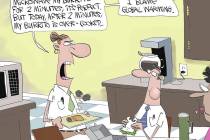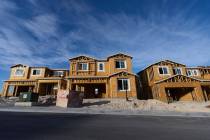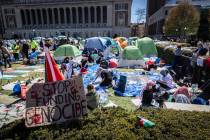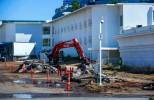What keeps us here?
Las Vegas has always been about growth and gambling. That's not all bad. This narrow focus transformed a remote watering hole on the Old Spanish Trail into an international destination of almost 2 million people.
But these obsessions have come at a price. Las Vegas has pursued tourists and development at the expense of a strong sense of civic pride and community involvement. This is a great place to make a buck, but for many it's not a desirable place to live and raise a family.
As Las Vegas slowly climbs out of its biggest economic hole in memory, the results of a UNLV survey should serve as the catalyst for a spirited effort to improve community-mindedness and quality of life across the valley.
Members of UNLV's sociology department spearheaded the scientific survey of area residents to determine their attitudes about the natural environment, community life and economic issues. The results were most intriguing on matters of community.
When the survey was released last week, reporters quickly seized on the results from this question: If you could live anywhere you want, where would you want to live? Forty percent of respondents said they would move out of Nevada altogether. Five percent would leave the Las Vegas Valley for another location in Nevada.
These figures strike some local observers as alarmingly high. A similar survey in Phoenix in 2006 showed that only 21 percent would move out of Arizona. Is Las Vegas such a lousy place to live that almost half the residents would leave if they could?
The UNLV survey did not ask follow-up questions seeking specific reasons why people would leave, but responses to other related questions shed some light on probable answers.
First, the recession has to be the primary factor. Las Vegas has one of the nation's highest unemployment rates. If people can't find work here, they're likely to want to move where they believe they can get a job.
But quality of life clearly is another factor. Survey participants were asked about their sense of belonging in Las Vegas. Only 35.5 percent felt a strong sense of belonging in the Las Vegas area, and only 33.2 percent felt a strong sense of belonging in their neighborhood.
Asked about social bonds with their neighbors, 41 percent said they "almost never" visit with their neighbors, and 63 percent said they "almost never" do favors for their neighbors.
On the quality of life here, 77 percent described it as "fairly good" or "very good." But when asked whether they think it will get better in the next 10 years, only 37 percent think it will improve and 40 percent believe it will get worse.
The survey was the subject of a Nevada Public Radio call-in program this week. A UNLV student said, "Once I get my degree, I'm skipping town. I don't want to raise a family here." A woman said she recently moved to St. George, Utah, because she didn't feel safe in Las Vegas anymore. A man said he often tells people, "This is where I live. It is not my home."
A couple of callers defended Las Vegas. A fourth-generation native said she has strong bonds with her neighbors and family members. She said if people aren't happy here, they should leave. "I don't want my children to grow up with all these negative people," she said. She wondered whether people who feel disconnected in Las Vegas are actually making an effort to change their circumstances. "You have to give in order to get," she said.
That sentiment was echoed by Lisa Mayo DeRiso, a community activist who is constantly rallying residents to various causes. "The people who say, 'I've lived here and didn't get a sense of community,' they expect the community to come to them," DeRiso said in an interview. "But the community isn't going to come to you. The future of our community, the breadth and depth of our relationships, is up to us. It's not up to commissioners or developers."
Although DeRiso is right that individual initiative is essential, local governments also can play an important role. For example, the physical environment, which in Las Vegas is characterized by walls and gates, can be an impediment to community activity.
County Commissioner Chris Giunchigliani recently proposed to create a panel of experts -- architects, home builders, engineers, etc. -- to discuss ways to make Las Vegas a more interactive place to live. The panel is a great idea, especially if it leads to a lively public dialogue and some practical action items to deal with neighborhoods ravaged by foreclosures or left unfinished because of the real estate bust.
Another way local governments could help is by organizing more public events in suburban neighborhoods. The city of Las Vegas, for example, has worked hard to build a stronger feeling of community in downtown neighborhoods. But with its resources dedicated to downtown, the city has all but ignored the bulk of its population. Park events and neighborhood block parties in the suburban areas are a modest proposal but could go a long way toward residents establishing a stronger bond with their city and their neighbors.
Geoff Schumacher (gschumacher@reviewjournal.com) is the Review-Journal's director of community publications. His column appears Friday.























